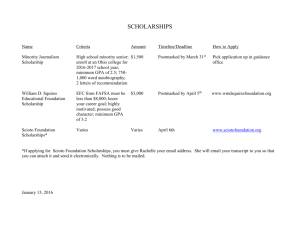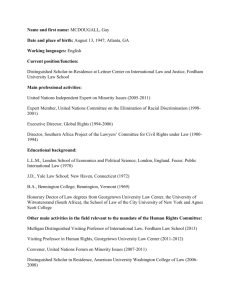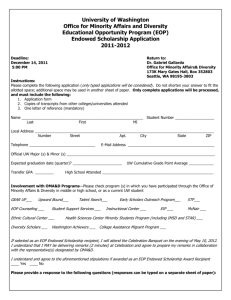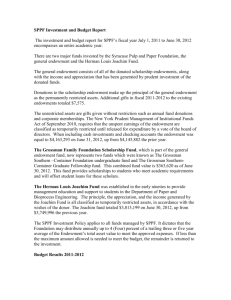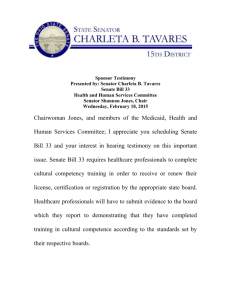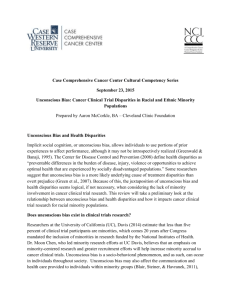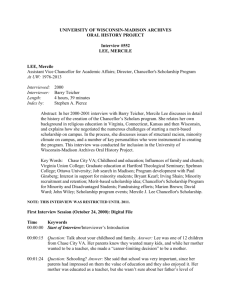Minority_Scholarship_and_Grant_Websites
advertisement
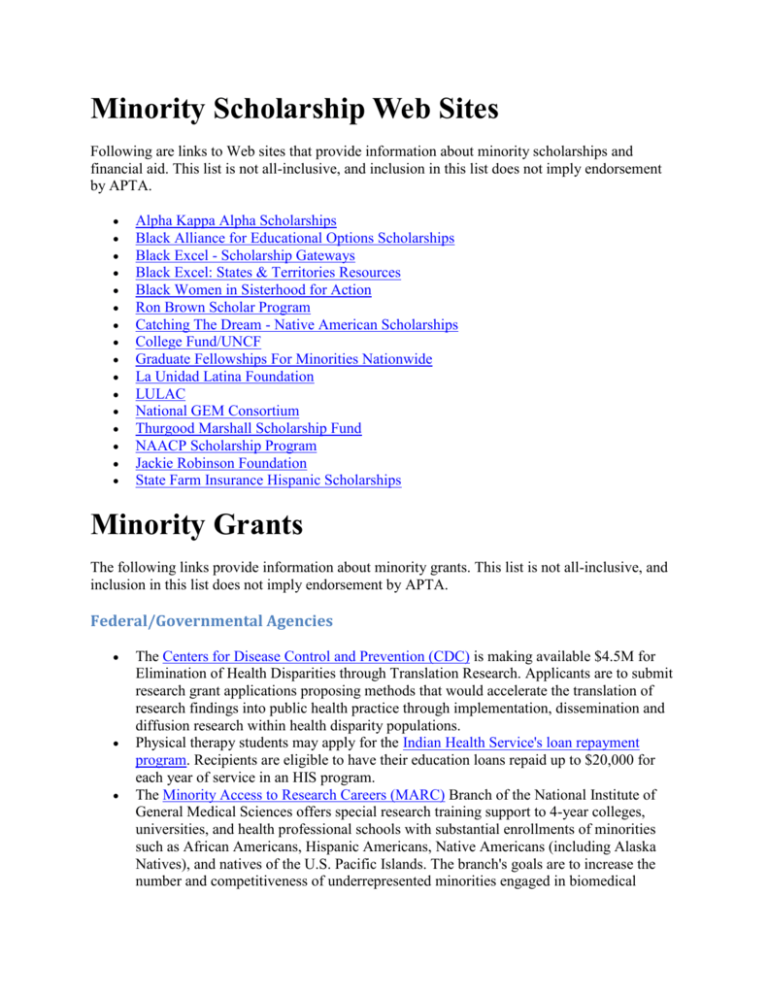
Minority Scholarship Web Sites Following are links to Web sites that provide information about minority scholarships and financial aid. This list is not all-inclusive, and inclusion in this list does not imply endorsement by APTA. Alpha Kappa Alpha Scholarships Black Alliance for Educational Options Scholarships Black Excel - Scholarship Gateways Black Excel: States & Territories Resources Black Women in Sisterhood for Action Ron Brown Scholar Program Catching The Dream - Native American Scholarships College Fund/UNCF Graduate Fellowships For Minorities Nationwide La Unidad Latina Foundation LULAC National GEM Consortium Thurgood Marshall Scholarship Fund NAACP Scholarship Program Jackie Robinson Foundation State Farm Insurance Hispanic Scholarships Minority Grants The following links provide information about minority grants. This list is not all-inclusive, and inclusion in this list does not imply endorsement by APTA. Federal/Governmental Agencies The Centers for Disease Control and Prevention (CDC) is making available $4.5M for Elimination of Health Disparities through Translation Research. Applicants are to submit research grant applications proposing methods that would accelerate the translation of research findings into public health practice through implementation, dissemination and diffusion research within health disparity populations. Physical therapy students may apply for the Indian Health Service's loan repayment program. Recipients are eligible to have their education loans repaid up to $20,000 for each year of service in an HIS program. The Minority Access to Research Careers (MARC) Branch of the National Institute of General Medical Sciences offers special research training support to 4-year colleges, universities, and health professional schools with substantial enrollments of minorities such as African Americans, Hispanic Americans, Native Americans (including Alaska Natives), and natives of the U.S. Pacific Islands. The branch's goals are to increase the number and competitiveness of underrepresented minorities engaged in biomedical research by strengthening the science curricula at minority-serving institutions and increasing the research training opportunities for students and faculty at these institutions. The Minority Biomedical Research Support (MBRS) Branch of the National Institute of General Medical Sciences awards grants to 2- or 4-year colleges, universities, and health professional schools with substantial enrollments of minorities. These grants support research by faculty members, strengthen the institutions' biomedical research capabilities, and provide opportunities for students to work as part of a research team. The National Center on Minority Health and Health Disparities (NCMHD) is pleased to announce funding for the Extramural Clinical Research Loan Repayment Program for Individuals from Disadvantaged Backgrounds ("ECR-LRP" or "Program"). The ECRLRP provides for repayment of the educational loan debt of qualified health professionals from disadvantaged backgrounds who agree to conduct clinical research for an obligated period of service no less than two years. The NCMHD, through the Program, seeks to recruit and retain highly qualified health professionals from disadvantaged backgrounds into clinical research careers. This is an effort to not only have qualified health professionals impact the medical processes within their communities, but also to engage and promote the development of clinical research programs that reflect an understanding of the variety of issues and problems associated with disparities in health status. Organizations The California Endowment has announced a new Grant Application Guide for prospective applicants. When The Endowment adopted a strategic plan in 2002, it helped clarify the foundation's focus with respect to what it believes is essential to achieving fundamental improvements in the health of Californians. With that in mind, The Endowment re-organized its work around three goals: Access to Health; Culturally Competent Health Systems; and Community Health and the Elimination of Health Disparities. While the foundation's dedication to supporting ideas and projects that come from community-based organizations across California is unwavering, these changes in grant making have been made in order to: (1) better focus resources on achieving The Endowment's mission; (2) better measure the impact of investments; (3) provide highquality customer service to applicants and grantees; and (4) build public support for needed health improvements in the state. In conjunction with the launch of the new Grant Application Guide, The Endowment's regional offices will be hosting information sessions for grantees, prospective grantees and partners throughout the state regarding the changes to the grant-making program and the grant application process.
